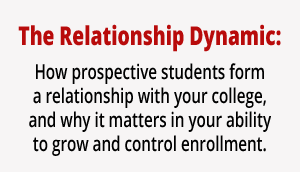In our most recent nationally co-sponsored study, The Excitement Factor!, 12,000 college-bound students shared insights with us about the ways colleges made them feel welcomed and wanted. We uncovered a number of surprises that underscore opportunities for colleges to differentiate themselves and build a stronger bond with the students you are recruiting.
 The most shocking discovery came when we asked students if the colleges they were considering had taken a personal interest in them at any point in the recruiting process. Two-thirds said “No” or “Don’t Remember” and in our view “Don’t remember” is the same as “No.” (You can DOWNLOAD the full report now.) Those who did experience personal interest from colleges were very specific in recalling who, what and how that interest was conveyed and how it laid the foundation for a relationship with the college that would lead to their enrollment.
The most shocking discovery came when we asked students if the colleges they were considering had taken a personal interest in them at any point in the recruiting process. Two-thirds said “No” or “Don’t Remember” and in our view “Don’t remember” is the same as “No.” (You can DOWNLOAD the full report now.) Those who did experience personal interest from colleges were very specific in recalling who, what and how that interest was conveyed and how it laid the foundation for a relationship with the college that would lead to their enrollment.
Handwritten notes impress.
Pen and paper seems so “1980’s,” so who would ever guess that Millennials and Gen-Z’s would respond favorably to handwritten notes? But they do! Numerous students shared stories about the “handwritten” notes they had received from admissions counselors, professors, alumni, other students, tour guides and coaches. These notes left a lasting impression and made them feel special (exactly how someone SHOULD feel about the college of their choice). One student summed it up, “Getting a personal letter from a professor I met on campus made me feel like they really wanted me. It was handwritten and he referred back to the conversation we had. That’s when I felt [the college] was the right fit for me.”
The right email CAN have big impact
Perhaps you have heard or taken part in the ongoing debate of the effectiveness of email communications from colleges to prospective students. The study definitely uncovered many nuances in students’ feelings about the subject. And, yes, just as you have suspected, a barrage of impersonal emails cluttering one’s inbox is NOT an effective recruitment tactic. However, well-crafted, personalized emails can be very meaningful and can contribute to building a bond between the student and college. Students cited examples of emails they received that impacted their college decision:
- “My admissions counselor emailed me a birthday card. None of my friends got that kind of attention from the colleges they were looking at.”
- “After we talked to a professor during a campus visit, my mom and I both got emails from her telling us how much she enjoyed meeting us. That was a deciding factor for me.”
- “It seemed like they really knew me. I got emails and invites for campus events and activities that interested me.”
Cultivate the influencers – they may be in unexpected places
You already know that many students are persuaded to attend a particular college because of friends or family members. As a matter of fact, nearly 40% of students participating in The Excitement Factor! study told us that their college choice was influenced by where a parent or sibling attended. But, we also discovered other outside influencers you need to know. Students described interactions with student teachers at their junior and senior high schools, faculty and staff members they met at various summer camps and academic competitions, and even shopkeepers at local stores as individuals who played a significant role in their college selection.
Get and use actionable data
Successful admission professionals know that creating a connection with a student can greatly increase his or her commitment to the college and improve the likelihood of enrollment. They know that building a relationship and continually strengthening a bond is crucial. We will be exploring this subject in great detail in our next national co-sponsored study, “The Relationship Dynamic: How prospective students form a relationship with your college, and why it matters in your ability to grow and control enrollment.” Join a consortium of some of the most highly-respected colleges and universities in the country to find out how YOUR OWN pool of prospective students have or have not formed a relationship with you. Co-sponsors find our studies valuable because of the wealth of information they gain– information they can use to drive action and change. For detailed information, colleges can download detailed information about the study by CLICKING HERE.
bond is crucial. We will be exploring this subject in great detail in our next national co-sponsored study, “The Relationship Dynamic: How prospective students form a relationship with your college, and why it matters in your ability to grow and control enrollment.” Join a consortium of some of the most highly-respected colleges and universities in the country to find out how YOUR OWN pool of prospective students have or have not formed a relationship with you. Co-sponsors find our studies valuable because of the wealth of information they gain– information they can use to drive action and change. For detailed information, colleges can download detailed information about the study by CLICKING HERE.
Continue the conversation on Twitter @LongmireCo. Be sure to Subscribe to Versions of Conversion today so you don’t miss any of this highly-valuable information.
 Karen Full is a highly-respected higher education professional who has held positions in admissions and enrollment management at several institutions in the Midwest and Florida. With her vast experience working with large and small, public and private colleges, Karen brings a valuable perspective to her role as an Enrollment Strategist at Longmire and Company.Call Karen at 913/492.1265 x.711 or email her at kfull@longmire-co.com. Follow Karen on Twitter @KarenAFull.
Karen Full is a highly-respected higher education professional who has held positions in admissions and enrollment management at several institutions in the Midwest and Florida. With her vast experience working with large and small, public and private colleges, Karen brings a valuable perspective to her role as an Enrollment Strategist at Longmire and Company.Call Karen at 913/492.1265 x.711 or email her at kfull@longmire-co.com. Follow Karen on Twitter @KarenAFull.

 The answer is: Take a personal interest in the prospective student.
The answer is: Take a personal interest in the prospective student. 




